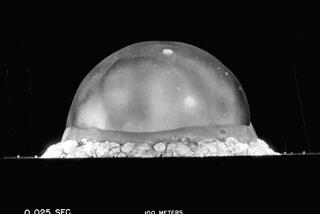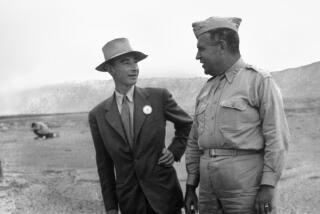In Defense of Einstein
- Share via
In reviewing “Einstein’s Monsters” by Martin Amis (The Book Review, June 28), Jack Miles, in his opening sentence, refers to Albert Einstein as “ . . . the gentle giant who brought us the bomb.” This is totally incorrect, and Miles, had he done his homework, would know better.
In 1905, at age 26, Einstein, in one of four scientific papers published in Germany, theorized that energy (expressed in ergs) was equal to matter (mass expressed in grams) times the velocity of light (expressed in centimeters per second). He scoffed at the idea that this power could ever be unlocked, until, 34 years later in 1939 after learning that German scientists had successfully split the atom, did he sign the famous letter to Roosevelt. The letter, by the way, was not composed by Einstein, he merely lent the enormous prestige of his name so that its contents would be heeded.
The great man only vaguely knew that work was being done to investigate the utilization of atomic energy and had absolutely nothing to do with the Manhattan Project. The ironic fact is that he was considered to be a poor security risk due to his outspoken pacifist views and supposed divided loyalties. The only tangible work he did toward the war effort was some research dealing with conventional explosives for the Navy.
To say that Einstein gave us the bomb is to say that the Wright brothers gave us the Challenger disaster.
Leopold Enfeld, Einstein’s longtime friend and collaborator, said it best. “Albert Einstein was probably the greatest scientist who ever lived, and the kindest man in the world.”
I would have left out “probably.”
An indignant Einstein buff,
ART HAYKIN
Los Angeles
More to Read
Sign up for our Book Club newsletter
Get the latest news, events and more from the Los Angeles Times Book Club, and help us get L.A. reading and talking.
You may occasionally receive promotional content from the Los Angeles Times.










